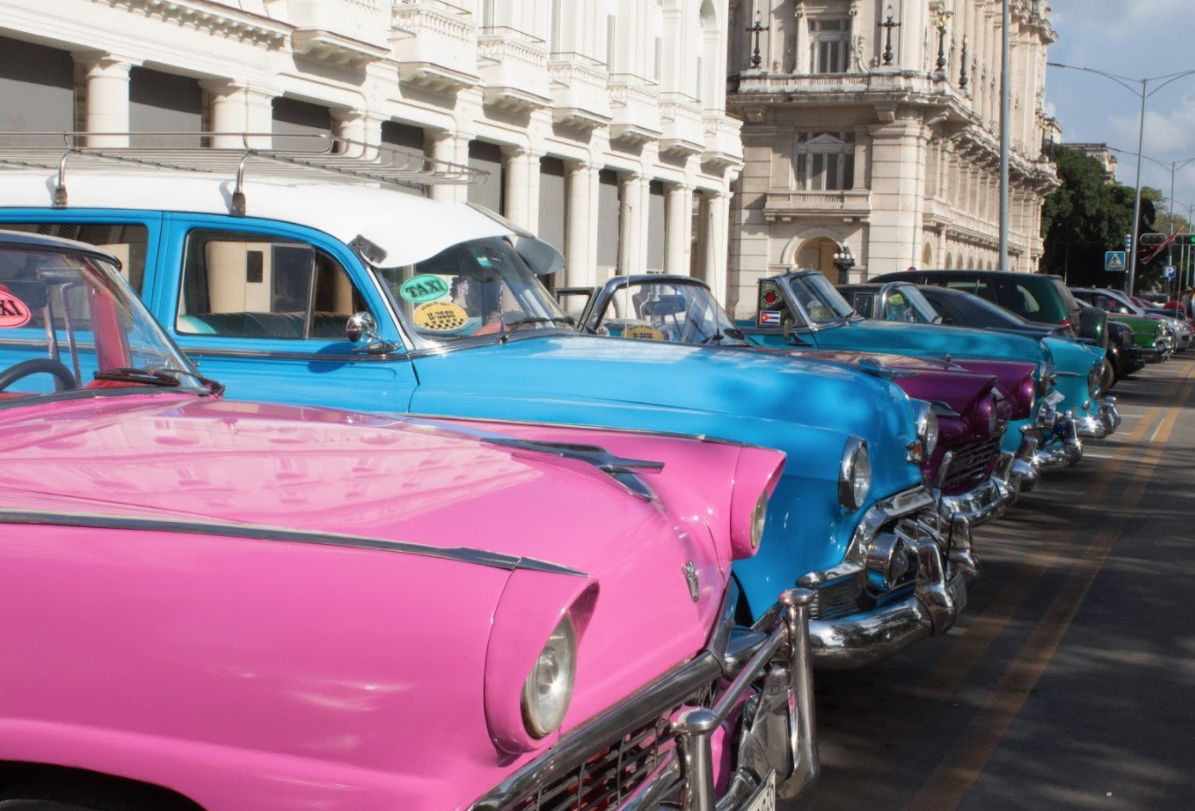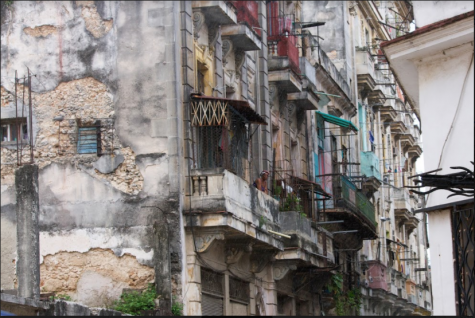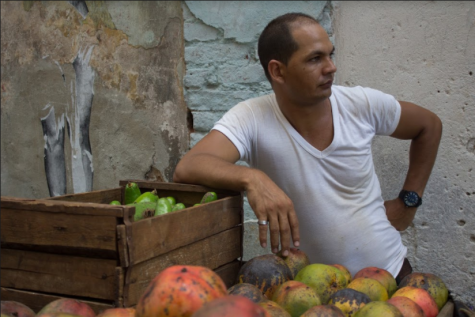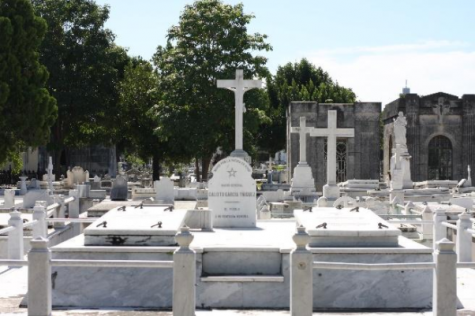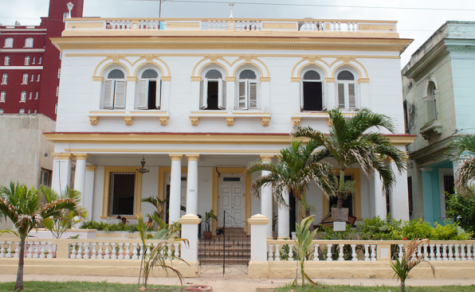Daisy Ortiz
Small business, big surprise
Havana is a mix between gray and white. I say gray because unfortunately for some and a blessing for others, even the best parts of Havana aren’t what you would see in the United States. Many of the hotels are built in the middle of run-down buildings in which people still live. Some businesses don’t even have the supplies to keep up.
When looking for a decent place to grab a meal my friend and I ran in to a small business called Dinos Olokku Pizza which seemed fine from the outside. Walking in we saw about 8 tables that seated each about 4 people. It was a very tiny establishment but after looking over the menu and seeing they at least had pizza and sandwiches we figured this would suffice our hunger for the night.
While they played reggaetón music videos on a flat screen T.V. and even some American music the doors to the kitchen were off the hinges and so the staff had to lift them in order to get through. At one point both Kali and I debated how good of an idea it had been coming in. In the United States, things are very controlled and you would have never seen an official restaurant in these conditions.
Cuba is a country that is highly controlled by the government and yet you find places like these that are very run down but functional and serve good food. Only a small pantry was visible in the establishment that stored minimal things such as rum, two kinds of chips and other one brand products. It really makes you think what the government is actually helping in.
Our food took about half an hour to come out even though there was only another small family of 3 eating and 3 other locals waiting for their food. It was definitely a joint for the locals, many others came in just to talk with the owners and staff but would leave shortly after. At no point, did we encounter another group of foreigners or a “Yuma” which is what Cubans call tourists.
Our under 4 CUC meal – which is equivalent to about 4 American dollars – was put over place mats and resulted to be a very satisfying meal. I had a sandwich with cheese, ham and mustard which provided a kick. Kali had a Hawaiian pizza that had a much more airy and thicker crust than we are used to but just as good.
The next day I went back hoping for a sandwich to go but when I asked the lady she told me it wasn’t possible for me to get one because they were out of bread. I was shocked honestly because there went half of their menu.
The restaurant system here is still a bit unclear to us outsiders but there are two types: state run and private restaurants. The state run ones have menus regulated by the government and they can’t deviate from what is put on there. Both pay a lot of taxes to stay in business.
This place seemed to have been a private one because I would like to believe that a state run restaurant wouldn’t run out of basic needs such as bread for the good of the business. If the government is permitting this I wonder in what ways is it benefiting the people.
Has Fidel’s death changed anything?
November 25, 2016, Cubans celebrated with pots and pans in the streets of Miami. Joyful of what they thought would be a turning point for their homeland, Cuba. In the United States, we got the news out right away and stopped transmitting other programs just to talk about the death of Fidel Castro.
The atmosphere in the capital La Havana though was a bit different. People weren’t cheering but it also wasn’t sadness. People did gather at the Revolution Plaza. Ray Sr., who is 66 years old and was around 8 years old right at the time of the revolution, says that after the revolution, he was finally able to access an education that provided not only good teachers but also books, notebooks, usable desks, and other basic needs for a proper education. Before they only had access to good teachers but no supplies, only half of an education.
Raul gave the announcement of his infamous brother’s death; however, it was only transmitted for a couple of minutes before regular programming returned. Even the news outlets didn’t give it much attention and the news of Castro’s death came towards the end.
I remember watching a ‘novela’ when my programming in California was interrupted and I heard the Univision correspondent announce Fidel’s death. I was shocked and the next footage shown was that of Cubans throughout Miami cheering and exclaiming their hope for Cuba.
Both Ray Sr., and his son, Ray Jr., agree that Cubans who live in Miami have a completely different life to those on the island. Many Cubans spoke hopefully saying “when Fidel dies, Fidel dies,” says Ray Jr., but “Fidel is dead and nothing has changed.” Ray Sr., however, says that “for poor people, the revolution was the best thing to happen.” He does see change even if it’s minimal.
The government does currently provide free education, health care, rations and it also allows people to have their own small business. If you are not working or have an extremely low income you can apply for the rations program which means the state provides you with a certain amount of eggs, bread, milk, and other basics paid through the taxes taken from the people. “The problem is in order to keep these things it takes a lot,” says Ray Jr.
“The revolution’s biggest mistake was to get more than it could afford,” Ray Sr. says. “First they had to have built an economy that could afford it.”
Ray Jr. kept speaking about hope but when asked what were his hopes for Cuba he stayed silent, thought about it and responded, “I actually do not know.” Raul Castro is now 86 years old and has announced he will be allowing others to run for president in 2018. This could result in a change in Cuban politics after over 60 years of Castro men.
Is baseball the new soccer for Cuba?
Even though the sport you first think of when Cuba is mentioned is baseball and many of the souvenirs include baseball and bat key chains, many Cubans walk around with soccer jerseys. Soccer has scored its way into Cuba’s heart.
I have run into people many times wearing a shirt or shorts with either a Real Madrid or FC Barcelona logo. It’s interesting because Spain is so much further than their nearest Latin-American neighbor, Mexico or up north, the United States and yet you don’t see them sporting the jerseys of these teams.
Just the other day, I was at the park and there were a group of teenagers playing soccer, just a casual game. One of them wore an FC Barcelona jersey and another guy – running on a naturally made track – wore shorts with the FC Barcelona logo.
Before coming to Cuba I knew its national soccer team wasn’t that great, so no high expectations, but is this why the Cuban people are rooting for outside teams? Where is the national patriotism? If they don’t have a good soccer team wouldn’t they want to have a stronger presence in the soccer world?
It’s also interesting that more people are wearing soccer gear than their own national obsession, which has been baseball. I’ve seen more kids out on the street with a soccer ball than baseballs and a bat.
Is it that baseball has turned into the sport the tourists know thus allowing soccer to pick up speed in Cuba among Cubans? Maybe we will be seeing a lot more of the Cuban soccer team within the next few years if people show their interest in the sport and make it happen.
Soccer is already an international game, the most popular game in the world. Hopefully, Cuba gets involved soon. They already have the passion and the outfits for it. They just need a competitive team at this point.
Viva Cuba!
Beisbol, Cuba’s number one
If there is one thing that unites the world, it’s sports. Europe and parts of Latin America are known for soccer, the United States is known for football and of course baseball. However, the Caribbean also excels in baseball.
Every souvenir shop you visit you can find a baseball bat with the Cuban flag or a leather baseball which make great gifts for any baseball enthusiasts. Not only that, but many children start playing the game at a very young age and take it very seriously.
The other day we went down to Ciudad Deportiva which is where one of the stadiums is found, the university for sports and a small baseball field. There were a group of kids finishing their game with some last exercises.
Cuba is hot and extremely humid. You can only imagine how the kids felt running out in the middle of the day, bright sun and in a whole baseball uniform. Even sitting in the stands was unbearable.
One of the older coaches called over one of the kids and told him in Spanish to not be the last one when jogging around the field. Another coach, this time a young man, was helping the kids stretch. He would put his knee on their back when trying to stretch and reach their foot.
Usually, in the states, that physical contact or having them doing workouts in the middle of the day when the sun is at its strongest seems more like a punishment than training. However, things are different here and a little push doesn’t mean an abuse of power.
Ten CUC? I think five…
My parents always demanded that my siblings and I speak purely Spanish in the household. We would learn English in school, so, for the most part, we followed their rule not realizing how much it would pay back later.
When first arriving in Cuba, the language barrier wasn’t on my list of concerns. I knew the language and even though some words would be slightly different I knew I could figure it out. The thing is has helped me knowing Spanish in the most while here has been in getting a taxi.
This is a simple task but not knowing the language or how to negotiate can make the difference between getting charged 10 CUC or five CUC which is about 10 and five American dollars. It didn’t take long for us to know what a good price to get to old Havana was and we do not budge from it.
Typically we want to pay one to two CUC per person. Usually this is an easy task if we don’t pick up the yellow cabs in front of the hotel. We usually walk down to “El Malecon” which is the seawall and only two blocks away to pick up a taxi ranging from five to seven CUC.
Many times, I give an offer and then they say yes or raise it. I like starting my number low so I can move up without hurting my wallet. Between my friends, I have become the master negotiator, I wink or slight smile here or there doesn’t hurt the cause either.
Every time a taxi tries charging me 10CUC I make a face of shock, say no thank you and walk away. Then they will call me over and ask how much I am willing to pay and we will negotiate from there, the cabs in front of the hotel, however, don’t negotiate and act like they’re the only taxis around.
Knowing how to get around and for cheap has been crucial, especially as college students. We cannot afford those extra $5 every time we catch a ride, especially because our hotel is not very close to many of the sites so we depend on public transportation a lot.
Tourists will always be at a disadvantage because they aren’t familiar with the area or prices of things. However, a major advantage will be knowing the language. This has made my time in Cuba easier and cheaper. We have been able to navigate ourselves within the city at a low cost.
Viva Cuba!
Two weeks back I was a student that had done their fair share of traveling and also a student that wanted to accumulate as many units possible in order to graduate next Spring 2018. The study abroad program in Cuba seemed like the perfect opportunity especially for my communication major and having it be journalism specific.
I was skeptical to embark on this journey because of the $5500 it cost, but like always, I said “whatever” and jumped all in. I had very little expectations of Cuba; I really couldn’t begin to imagine how it was going to be even after others would say how heavily regulated it was by the government and the poverty you see over there.
Cuba resulted in a huge learning experience. With every walk down its small streets, between every conversation with professionals who are working as taxi drivers or cleaning ladies and every observation you made led to learning something new.
I learned that the average taxi driver and cleaning lady make around 20 CUC per month which is equivalent to 20 American dollars. As an American, you can’t even imagine living with such a tight budget. That money alone goes to gas on a regular week for me.
Given this financial crisis, professionals choose to work in tourism such as being a taxi driver or an employee in a hotel because they know they can make tips off tourists and many times people also leave behind shoes or other gifts which they are very appreciative for.
It may seem like Cubans are living in extreme poverty and unhappy with their lifestyle and government but being there you would pick up a different vibe. People didn’t seem unhappy at all. Many of them will always receive you with a smile and a warm hello.
On weekend nights many locals hang out at “El Malecon” – the seawall – just drinking and dancing. They’re many times in a joyous mood and take their time on things. The clock isn’t as important to them as it is in the states.
Cuba has its treasures and there is no doubt. It’s a diamond in the rough but a diamond nonetheless. It explodes in color, hospitality and relaxation. Life out there is much less stressful than in the states. It has reminded me to grow in patience and take in the little things in life, we do not need material things to be happy. Clearly, the Cubans don’t. And therefore, Viva Cuba!


